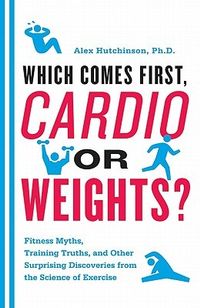
Which Comes First, Cardio or Weights?: Fitness Myths, Training Truths, and Other Surprising Discoveries from the Science of Exercise
A Science, Fitness, Sports book. This book debunks some of the most popular myths about training...
In Which Comes First, Cardio or Weights? Alex Hutchinson, a physicist, award-winning journalist, and contributing editor of Popular Mechanics magazine, reveals the little-known and often surprising truths that science has uncovered about exercise. A book that ranges from cardio and weights to competition and weight loss, here are fascinating facts and practical tips for fitness buffs, competitive athletes, and popular science fans alike.
Download or read Which Comes First, Cardio or Weights?: Fitness Myths, Training Truths, and Other Surprising Discoveries from the Science of Exercise in PDF formats. You may also find other subjects related with Which Comes First, Cardio or Weights?: Fitness Myths, Training Truths, and Other Surprising Discoveries from the Science of Exercise.
- Filetype: PDF
- Pages: 336 pages
- ISBN: 9780062007537 / 0
SJBf19Y_Kv-.pdf
More About Which Comes First, Cardio or Weights?: Fitness Myths, Training Truths, and Other Surprising Discoveries from the Science of Exercise
An excellent summary of everything exercise (and much of nutrition) related. Highly recommended to everyone starting an exercise regime, and even to those who exercise for a long time. This book debunks some of the most popular myths about training and condenses a wealth of recent scientific research making it a must read reference for everyone interested in sports and fitness training. It answers many of the questions that have puzzled me for a long time and the information is conveyed in a very simple and clear... This was an enjoyable and interesting read. I've been a little obsessive about fitness lately (I'm a marathon runner), and this book was right up my alley.There are a lot of articles on Runner's World and other websites that basically review a recent study and discuss the implications. This book is basically over 100 of those articles...











